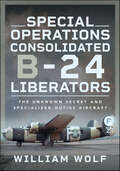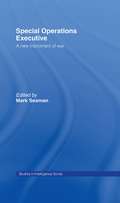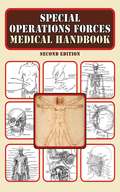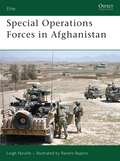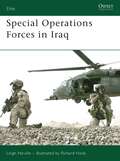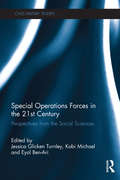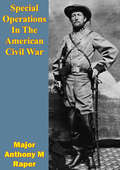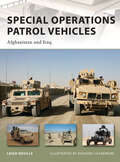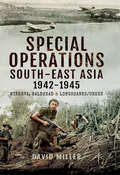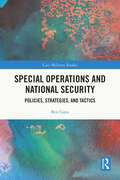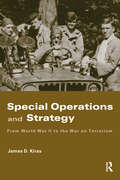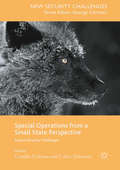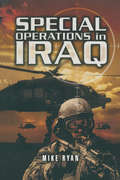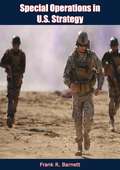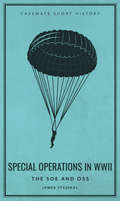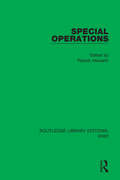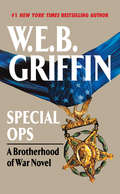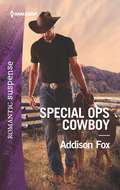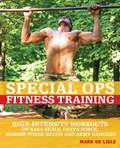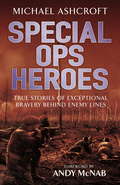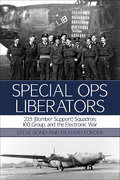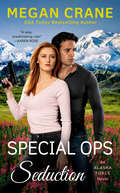- Table View
- List View
Special Operations Consolidated B-24 Liberators: The Unknown Secret and Specialized Duties Aircraft
by William Wolf“For anyone interested in the B–24 and some of its more unusual applications, details that most books gloss over, and in some interesting tales of little-known aspects of the air war, this is certainly a book to read—and read closely.” -The Journal of the Air Force Historical Foundation Despite being America’s most produced bomber, the Consolidated B-24 Liberator has forever flown in the shadow of its more famous and glamorous B-17 rival. The workmanlike B-24 performed multiple unheralded roles in all theatres beyond its also multiple offensive missions, making it the war’s most versatile heavy bomber. Besides its offensive bombing, anti-submarine, and mining missions, the Liberator performed many little known “inoffensive” duties. Undoubtedly the most colorful of all Liberators were the so-called assembly ships of the Groups of the 2nd Air Division. Their unique paint schemes of stripes, polka dots, and checkerboard, were designed to make them ultra-conspicuous for their task of acting as leaders on which a Group formation could assemble their combat formations more quickly for a combat mission The Consolidated F-7 was a photographic reconnaissance version of the B-24 Liberator. The F-7 saw service in most theatres of the war. The long range of the Liberator also made it well suited to mapping missions during the war and post-war. Beginning in early 1944, to aid the Allied liberation of Europe, Carpetbagger B-24s were utilized to parachute spies, called “Joes” or “Janes”, or provide aerial supply of weapons and other matériel to resistance fighters in occupied Europe. Liberators also participated in the dropping of 2.75 billion propaganda leaflets using various techniques and delivery devices. Electronic Warfare played an important part in Allied global pre-invasion plans to discover the location of enemy radars, and, if possible, destroy them. This interception and analysis of an enemy electronic radiation was the origin of present day ELINT (ELectonicINTelligence). Modified RAF B-24D Airborne Electronic Reconnaissance Liberators, codenamed Ferret, were Radio Counter Measures and Electronic Intelligence aircraft that played a major role in European air opera¬tions. During 1942 the AAF became interested in aerial refueling as a means to bombing Japan. A shorter-range B-17E was selected as the receiver aircraft while the more spacious B-24D acted as the tanker. Although these tests were considered to be successful, the availability of longer-ranging B-29s and bases ever closer to Japan diminished the urgency of wartime aerial refueling. During the war, eighty-three B-24s crashed or made forced landings in Switzerland, sixty in Sweden, and several in Russia, Spain, Portugal, and Turkey. Many of these Liberators landed undamaged or were repaired to be flown by these nations. Of particular interest are the six Liberators that were captured and flown by the Luftwaffe. Packed with a unique collection of photographs. Special Operations Consolidated B-24 Liberators reveals the most unusual and little-known facets of the Second World War’s most versatile bomber.
Special Operations Executive: A New Instrument of War (Studies in Intelligence)
by Mark SeamanThis unique book presents an accurate and reliable assessment of the Special Operations Executive (SOE). It brings together leading authors to examine the organization from a range of key angles. This study shows how historians have built on the first international conference on the SOE at the Imperial War Museum in 1998. The release of many records then allowed historians to develop the first authoritative analyses of the organization’s activities and several of its agents and staff officers were able to participate. Since this groundbreaking conference, fresh research has continued and its original papers are here amended to take account of the full range of SOE documents that have been released to the National Archives. The fascinating stories they tell range from overviews of work in a single country to particular operations and the impact of key personalities. SOE was a remarkably innovative organization. It played a significant part in the Allied victory while its theories of clandestine warfare and specialised equipment had a major impact upon the post-war world. SOE proved that war need not be fought by conventional methods and by soldiers in uniform. The organization laid much of the groundwork for the development of irregular warfare that characterized the second half of the twentieth century and that is still here, more potent than ever, at the beginning of the twenty-first. This book will be of great interest to students of World War II history, intelligence studies and special operations, as well as general readers with an interest in SOE and World War II.
Special Operations Forces Medical Handbook
by Department of DefenseThe newest edition of the Special Operations Forces Medical Handbook is perfect and practical for both soldiers and civilians. Nearly 140 comprehensive illustrations show the proper techniques for medical care, from basic first-aid and orthopedics to instructions for emergency war surgery and even veterinary medicine. Questions are listed so that the medic can obtain an accurate patient history and perform a complete physical examination. Diagnoses are made easier with information on the distinctive features of each illness. This straightforward manual is sure to assist any reader faced with a medical issue or emergency.
Special Operations Forces in Afghanistan
by Ramiro Bujeiro Leigh NevilleIntelligence specialist Leigh Neville identifies, describes and illustrates the Special Operations Forces (SOF) of the US and other Allied (Coalition) forces committed to the 'War on Terror' in Afghanistan since 2001, providing a fascinating insight into specific operations detailing weapons, equipment and experiences in combat. With a surprising amount of recently unclassified material from government departments that are yet to be published in the mass media, this is a ground-breaking analysis of the largest mobilization of Special Forces in recent history. Extensive first-hand accounts provide an eyewitness perspective of the fighting including a description of the assault on Tora Bora, all illustrated with an array of unpublished photos and full color artwork. Containing detailed information on the US Delta Force, the British SAS, Australian and Canadian Special Forces as well as CIA and MI6 operational units this book provides a crucial study of their skills and success amidst Afghan mountains.From the Trade Paperback edition.
Special Operations Forces in Iraq
by Leigh Neville Richard HookIntelligence specialist Leigh Neville identifies, describes and illustrates the Special Operations Forces (SOF) of the US and other Allied (Coalition) forces committed to war in Iraq since 2003, providing a fascinating insight into specific operations, detailing weapons, equipment and experiences in combat. With a surprising amount of recently declassified material from government departments that are yet to be published in the mass media, this is a ground-breaking analysis of the largest mobilization of Special Forces in recent history. With extensive first-hand accounts providing an eyewitness perspective of the fighting on the ground and including information on the US Delta Force, the British SAS, Australian and Canadian special forces as well as CIA and MI6 operational units this book provides a crucial study of their skills and success in Iraq from the Battle of Debecka to storming the safe house of Uday Hussein. In a controversial war that has been plagued by high fatalities and military blunders, this book highlights the successes enjoyed by Special Forces operatives. This book serves as a companion volume to Elite 163: Special Forces Operations: Afghanistan.From the Trade Paperback edition.
Special Operations Forces in the 21st Century: Perspectives from the Social Sciences (Cass Military Studies)
by Eyal Ben-Ari Jessica Glicken Turnley Kobi MichaelThis book sets out the major social scientific approaches to the study of Special Operations Forces. Despite consistent downsizing, over the past two decades the armed forces of the industrial democracies have seen a huge growth in Special Operations Forces (SOF). Through increasing numbers of personnel and more frequent deployments, SOF units have wielded considerable influence in conflicts around the world, with senior SOF officers having led major strategic operations. This increased presence and unprecedented expansion for SOF is largely a result of the ‘new’ kinds of conflicts that have emerged in the 21st century. At the same time, even with this high profile in the military, policy and media and popular cultural arenas, there is relatively little social scientific research on SOF. This volume aims to fill this gap by providing a series of studies and analyses of SOF across the globe, since the end of World War II. Analysing SOF at the micro, mezzo and macro levels provides broad and diverse insights. Moreover, the volume deals with new issues raised by the use of such forces that include emerging modes of civilian control, innovative organizational forms and the special psychological characteristics necessitated by SOF operatives. It concludes with a discussion of a question which continues to be debated in today’s militaries: what makes SOF ‘special’? Filling a clear gap in the literature, this book will be of much interest to students of strategic studies, civil-military relations, irregular warfare, security studies, and international relations.
Special Operations In The American Civil War
by Major Anthony M. RaperThis study is a historical analysis of selected special operations missions in the American Civil War. The analysis is intended to determine if there are lessons to be learned from these operations that are applicable to present special operations forces.Selected Civil War direct action and unconventional warfare missions are examined in detail from the planning stage through mission completion and analyzed at the tactical level from the perspectives of special operations applications of the principles of war and the SOF imperatives. Union and Confederate special operations are examined for effectiveness against modern doctrine from the operational and strategic levels.The study reveals that many of the lessons learned from a historical analysis of Civil War special operations missions are equally important to success today. The modern special operator who conducts a review of similar operations from the past or who has a good historical background in these missions has a great advantage when conducting special operations today.
Special Operations Patrol Vehicles
by Leigh Neville Richard ChasemoreThe patrol vehicles used by Special Operations Forces in Afghanistan and Iraq vary quite dramatically between the theaters as well as amongst the Coalition members, and have been developed and upgraded to meet the demands of the deployment. Covering all the major Coalition nations, Leigh Neville continues his look at the elite forces deployed in Operations Enduring Freedom and Iraqi Freedom with this analysis of their vehicles.Tracing the evolution of the vehicle types, from their historical precedents, through their designs to their operational developments, he discusses their advantages and disadvantages, along with their tactical employment. From the mine-protected vehicles used to counter the IED threat in Iraq, the use of Strykers as armored raiding platforms by the US Rangers, to the civilian vehicles adapted for military service by both Coalition troops and Private Military Contractors in the regions, this book uses rare in-theater photographs and color artwork to show the variety and inventiveness of the patrol vehicles being used in combat today.From the Trade Paperback edition.
Special Operations South-East Asia 1942–1945: Minerva, Baldhead & Longshank/Creek
by David MillerMany books have been written about Second World War special forces operations in Europe and the Middle East. Much less has been said about such operations in South-East Asia those launched against the Japanese in Sumatra and the Andaman Islands, and the Germans in Goa. These operations, and the exceptional men who took part in them, have been almost forgotten. David Miller, in this gripping account, sets the record straight. His book is based on extensive original research, including long-hidden family documents, revealing much information for the first time and his narrative is fascinating reading for anyone who is interested in special operations and the war against the Axis powers in South-East Asia. His history is the first general account of these operations - it is a landmark in the field.
Special Operations and National Security: Policies, Strategies, and Tactics (Cass Military Studies)
by Ben GansThis book focuses on strategic special operations and how these have led to the achievement of major foreign policy goals, which is illustrated by six case studies.The study specifically focuses on the alignment of the policies, strategies, and tactics that dominated these operations, providing a fresh perspective. Theoretically, the work underscores the continued relevance of relative superiority as the dominant theory in the field. Importantly, it aligns the potential ways of achieving and sustaining relative superiority with the ability to conduct contemporary special operations across multiple domains, thereby generating cross-dimensional effects. In terms of methodology, the book includes a description and analysis of six distinct case studies in special operations, ranging from short-term surgical strikes to sustained special warfare campaigns and spanning multiple geographic regions – including in Iran, Lebanon, Syria, Ukraine, and the South China Sea. From that perspective, relative superiority theory is extrapolated to explain how this critical condition can be achieved and sustained during protracted special operations. The unique value of this research is underscored by the author's collection of exclusive primary source data on the operations in the respective countries. The book’s conclusions explain how the personnel involved fulfill the strategic promise of special operations, given their position within the larger framework of foreign policy.This book will be of much interest to students of special operations, military and strategic studies, defense studies, and security studies in general.
Special Operations and Strategy: From World War II to the War on Terrorism (Strategy and History #Vol. 17)
by James D. KirasJames D. Kiras shows how a number of different special operations, in conjunction with more conventional military actions, achieve and sustain strategic effect(s) over time. In particular, he argues that the root of effective special operations lies in understanding the relationship existing between moral and material attrition at the strategic level. He also presents a theoretical framework for understanding how special operations achieve strategic effects using a unique synthesis of strategic theory and case studies. This study shows how the key to understanding how special operations reside in the concept of strategic attrition and in the moral and material nature of strategy. It also highlights major figures such as Carl von Clausewitz, Hans Delbrück, and Mao Zedong, who understood these complexities and were experts in eroding an enemy’s will to fight. These and other examples provide a superb explanation of the complexities of modern strategy and the place of special operations in a war of attrition. This book will be of great interest to all students and scholars with an interest in special forces and of strategic and military studies in general.
Special Operations from a Small State Perspective
by Gunilla Eriksson Ulrica PetterssonThis book offers different perspectives on the utilization and development of special operations forces (SOF) in small states. Across the chapters, the authors argue that small states can use and develop this very unique capability both at a tactical and operational level, but also as a strategic instrument in the modern complex security environment. The study finds that SOF in small states has a new role to play and that it needs to become a more agile and flexible force, ready to address future security challenges. A reorientation in favour of SOF from a small state perspective is crucial both due to the changing security situation in Europe, and the need to economise military resources.
Special Operations in Iraq
by Mike RyanThis sensational book reveals the true and compelling story of the Special Force units of the Coalition, such as the SAS, SBS and Delta Force who worked in the shadows, often unseen, unheard and unsung. It describes their missions behind the lines from the early days, well before hostilities opened formally. It was an open secret that groups were deployed probably operating in the western desert against Saddam's forces and the Scud missile threat. What was actually going on is revealed here and until now their roles and actions have not been described in any detail. These are thrilling tales of incredible daring and endurance told by men whose courage and military skills are inspiring. The book also covers operations such as the spectacular rescue of POW Private Lynch and the secret operations to target Saddam and other leaders of his regime of terror.
Special Operations in U.S. Strategy
by Richard H. Shultz Frank R. Barnett B. Hugh TovarA series of studies and discussions on the impact of Special Operations. Includes analysis of the threat to the US, the Soviet approach, military capabilities, intelligence and special operations, psychological operations and low-intensity conflicts. Predating the fall of the Soviet Union, the Gulf conflicts and the events of 9/11/2001, this is an interesting insight to military thinking in the late 1980s. (Published: 1988)—Print ed.
Special Operations in WWII: The SOE and OSS (Casemate Short History)
by James StejskalA brief history of secret British and American World War II organizations, their training, tools, successes, and their legacy.Winston Churchill famously instructed the head of the Special Operations Executive to “Set Europe ablaze!” Agents of both the British Special Operations Executive and the American Office of Strategic Services underwent rigorous training before making their way, undetected, into occupied Europe to do just that. Working alone or in small cells, often cooperating with local resistance groups, agents undertook missions behind enemy lines involving sabotage, subversion, organizing resistance groups and intelligence-gathering. SOE’s first notable success was the destruction of a power station in France, stopping work at a vital U-boat base. Later operations included the assassination of Himmler’s deputy Reinhard Heyrich and ending the Nazi atomic bomb program by destroying the heavy water plant at Vemork, Norway. OSS operatives established anti-Nazi resistance groups across Europe, and managed to smuggle operatives into Nazi Germany, including running one of the war’s most important spies, German diplomat Fritz Kolbe. All missions were incredibly dangerous and many agents were captured, tortured, and ultimately killed—the life expectancy of an SOE wireless operator in occupied France was just six weeks. In this short history, historian James Stejskal examines why these agencies were established, the training regime and ingenious tools developed to enable agents to undertake their missions, their operational successes, and their legacy.
Special Operations: The Men And Women Of The Special Operations Executive (Routledge Library Editions: WW2 #33)
by Patrick HowarthThis book, first published in 1955, collects together accounts of some of the men and women who served as members of the remarkable S.O.E. This organisation was set up by Britain to encourage, help and organise resistance movements in occupied countries, and this book provides a valuable record of the types of people involved, and the work that they undertook.
Special Ops (Brotherhood of War #9)
by W.E.B. GriffinIn November 1964, Cuban revolutionary Che Guevara went to the Congo intent on taking over Africa and South America. He failed. Licking his wounds he returned to Cuba to recruit more men and try the same thing in Bolivia. <P><P>He failed there, too in fact he died there. But who was trying to kill him, really? And who was trying to keep him alive?
Special Ops Cowboy: A Western Romantic Suspense Novel (Midnight Pass, Texas #2)
by Addison FoxDeath stalks a cowboy&’s growing familyIt&’s a typical Texas night when Reese Grantham intends to drown her sorrows in a local bar. Her evening soon turns around, thanks to military operative turned rancher Hoyt Reynolds. Before she knows it, Reese is expecting a bundle of joy, but when she enters a killer&’s crosshairs, there&’s nothing Hoyt won&’t do to save her and his child.From Harlequin Romantic Suspense: Danger. Passion. Drama.Feel the excitement in these uplifting romances, part of the Midnight Pass, Texas miniseries:Book 1: The Cowboy's Deadly MissionBook 2: Special Ops CowboyBook 3: Under the Rancher's ProtectionBook 4: Undercover K-9 Cowboy
Special Ops Exclusive (The Hunted)
by Elle KennedyIn the midst of revolution, a renegade reporter and a Special Ops commando team to go after the truth in this sexy military romance series.Nothing will stop star journalist Rebecca Parker from getting a story—not a rioting mob, or even the sexy military man who literally sweeps her off her feet to safety. Nick Prescott is a hot number, a killer headline, and a bad liar. Who is he really? Who wants him dead? And how is he tied to the sinister government plot Rebecca’s been investigating? By teaming up with Nick to uncover the truth, the red-haired spitfire puts her own life in danger. Ignoring his warnings to walk away, Rebecca proves that she does what she wants and makes no apologies. But can this fierce survivor get the love she needs?
Special Ops Fitness Training: High-Intensity Workouts of Navy Seals, Delta Force, Marine Force Recon and Army Rangers
by Mark De LisleTest yourself against the world&’s most elite fighting forces with this fitness program modeled after the special operations training programs. In Special Ops Fitness Training, ex-Navy SEAL Mark De Lisle brings together the most rigorous conditioning techniques from America&’s top military programs in order to create the ultimate workout. Packed with mind-challenging, body- strengthening tasks that test the mettle of any athlete, this phenomenal conditioning manual presents the best of the best as it shows you how to reach the highest levels of fitness. Every aspect of training is incorporated into the program, including warm-ups, stretching, upper body, lower body, cardio, running, swimming, goal-setting, and motivation. The author has trained thousands of people and witnessed time and again the amazing results achieved by these unique techniques. He teaches readers what it takes to rise to the occasion when nothing less than total commitment will do. Drawn from the actual programs used by America&’s special operation forces: •Navy SEALs •Army Rangers •Delta Force •Marine Force Recon
Special Ops Heroes
by Michael AshcroftSpecial Ops Heroes tells the extraordinary stories behind Lord Ashcroft's collection of SAS and other Special Forces medals - the largest of its kind in the world. The action-packed stories span some sixty years from the exploits of the newly-formed SAS early in the Second World War to the end of the twentieth century. It features several remarkable groups of medals for some of the most audacious escapades of the Second World War as well as more recent medals awarded for bravery in Northern Ireland, Darfur and at the Iranian Embassy Seige in London.
Special Ops Heroes
by Michael AshcroftSpecial Ops Heroes tells the extraordinary stories behind Lord Ashcroft's collection of SAS and other Special Forces medals - the largest of its kind in the world. The action-packed stories span some sixty years from the exploits of the newly-formed SAS early in the Second World War to the end of the twentieth century. It features several remarkable groups of medals for some of the most audacious escapades of the Second World War as well as more recent medals awarded for bravery in Northern Ireland, Darfur and at the Iranian Embassy Seige in London.
Special Ops Liberators: 223 (Bomber Support) Squadron, 100 Group, and the Electronic War (Bomber Support)
by Steve Bond Richard ForderThis WWII Royal Air Force history reveals the activities of special ops squadrons and the electronic warfare and countermeasures they deployed. Established within the Royal Air Force Bomber Command, No. 100 Group was dedicated to the complex business of electronic warfare. Though its role was vital, it remains one of the least understood aspects of RAF operations during the Second World War. In this meticulously researched volume, aviation historian Steve Bond and Squadron Leader Richard Forder RAF (Ret&’d) shed important light on the work of No. 100 Group by analyzing one of its Bomber Support Squadrons, No. 223. Equipped with former USAAF Liberators, No. 223 Squadron operated from August of 1944 to the end of the European war. Its primary role was protecting Bomber Command Main Force ops through the use of experimental radio and radar countermeasures against German defenses. With unique access to original documents and firsthand accounts from both sides of the conflict, Forder and Bond present a detailed and comprehensive picture of the secret activities of these special operatives and their effect on German defenses.
Special Ops Seduction (An Alaska Force Novel #5)
by Megan CraneShe's the last woman he ever wanted to see again... After an official operation turned deadly, Jonas Crow began a new life in Grizzly Harbor with Alaska Force. But when fellow soldier Bethan Wilcox joins the group, she forces him to remember things he actively prefers to forget. That&’s unforgivable enough. But now the two of them are forced together on a mission to uncover deadly secrets tied to their complicated past, and with the heat between them at a boil, forgiveness is the least of his worries... And the only woman he needs. Bethan Wilcox, one of the first women to make it through Army Ranger school, didn't join Alaska Force to deal with Jonas's foul temper. Or her own errant attraction to him. Thrown together in a race against the clock, they have to pretend to be a couple and play nice to throw the enemy off their scent. She knows better than to let their pretend love feel real...especially while time is running out. Jonas has always been good at saving the world. But it&’s Bethan he needs to save this time around—if she doesn&’t save him first.
Special Ops: Four Accounts of the Military's Elite Forces
by Orr KellyFour military histories from a writer &“whose fine work should be of great interest . . . both to casual readers and to uniformed students of special ops&” (Publishers Weekly). An expert in military affairs, Orr Kelly reveals the cutting-edge technology and jaw-dropping courage of the US military&’s elite forces on land, sea, and air. Brave Men, Dark Waters: Originating in World War II as Underwater Demolition Teams, the Navy SEALs are the best of the best in the armed forces—known for their toughness and fearlessness, and their remarkable ability to get the job—any job—done. Facing America&’s enemies across the globe, these modern warriors were the first to enter the fight in Vietnam, Panama, Grenada, and Iraq. Brave Men, Dark Waters is &“the most complete in-depth study of this fabled elite unit&” (Library Journal). Never Fight Fair!: Here, in their own words, are the true accounts of the US Navy SEALs—from their formation in World War II to the jungles of Vietnam to the deserts of Iraq. In this riveting oral history, these brave men speak openly about their training and their missions, offering the uncensored, inspiring, and sometimes shocking truth about their combat triumphs and their rare but devastating failures. Hornet: Born in 1978, the McDonnell Douglas F/A-18 Hornet has forever changed the way America&’s wars are fought. This is the fascinating true story of the controversial development and deployment of the state-of-the-art supersonic fighter and attack aircraft with a top speed of more than one thousand miles per hour. Kelly details how Hornet came to be, how it was nearly doomed by an unprecedented political battle, and how it has served ably in combat from its first mission in Libya to Operation Desert Storm and well beyond. From a Dark Sky: Very little is known about US Air Force Special Operations—yet their exploits have been as daring and their achievements as remarkable as anything accomplished by their brother warriors. Since World War II, these ultrasecretive air commandos have routinely performed the nearly impossible, from providing air support for partisans in Nazi-occupied France to participating in clandestine CIA operations in Vietnam and Cambodia to secretly inserting covert operatives into North Korea. From a Dark Sky is &“a well-conceived and well-executed, well-deserved tribute to an uncommonly fine body of American warriors&” (Booklist).
